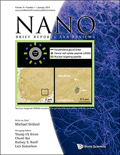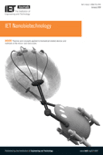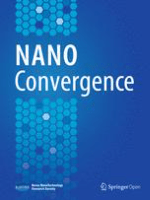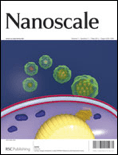
International Journal of Nano Dimension
metrics 2024
Catalyzing breakthroughs in nanotechnology applications.
Introduction
The International Journal of Nano Dimension is a premier publication dedicated to advancing the field of nanotechnology and its applications across various disciplines, published by the Islamic Azad University, Tonekabon Branch. With an ISSN of 2008-8868 and an E-ISSN of 2228-5059, this journal serves as a vital platform for researchers, professionals, and students seeking to disseminate and access cutting-edge findings in nano materials and their integration into science and engineering. The journal has gained notable recognition in Scopus rankings, especially within the fields of Materials Science and Chemical Engineering, emphasizing its commitment to high-quality research. Spanning the years from 2019 to 2024, the journal emphasizes open access to foster knowledge sharing in the scientific community. As nanotechnology continues to revolutionize industries, the International Journal of Nano Dimension plays an essential role in showcasing transformative research that addresses the challenges and opportunities of this dynamic field.
Metrics 2024
 -
- 1.20
1.20 1.50
1.50 -
-Metrics History
Rank 2024
Scopus
IF (Web Of Science)
JCI (Web Of Science)
Quartile History
Similar Journals

Micro & Nano Letters
Fostering collaboration in micro and nano sciences.Micro & Nano Letters is a prominent open-access journal published by WILEY, dedicated to advancing the fields of micro and nanoscale science and technology. Since its inception in 2007, the journal has been a valuable resource for researchers, professionals, and students, delivering high-quality research that supports innovation and collaboration in bioengineering, biomedical engineering, condensed matter physics, materials science, and nanoscience. With an impact factor that reflects its growing influence, Micro & Nano Letters has earned recognition in various Scopus categories, including a Q3 ranking in both Condensed Matter Physics and Materials Science as of 2023. Its commitment to open access, established in 2021, ensures that the latest developments in micro- and nanotechnologies are accessible to a global audience, fostering a multidisciplinary dialogue across academia and industry. The journal continues to play a critical role in disseminating cutting-edge research and promoting technological advancements worldwide.

Journal of Optoelectronic and Biomedical Materials
Illuminating the Future of Optoelectronics in MedicineJournal of Optoelectronic and Biomedical Materials (ISSN: 2066-0049) is a peer-reviewed academic journal published by the renowned VIRTUAL INSTITUTE OF PHYSICS, dedicated to advancing research in the interdisciplinary fields of optoelectronics and biomedical materials. This journal aims to provide a platform for researchers, professionals, and students to disseminate their findings on innovative materials and technologies that harness optical and electronic properties for biomedical applications. With an increasing significance in medical diagnostics, therapeutic approaches, and advanced materials science, the Journal of Optoelectronic and Biomedical Materials underscores the importance of facilitating collaboration among scientists from diverse fields. While currently operating under a traditional access model, the journal aspires to enhance global accessibility to cutting-edge research contributions that will drive the future of technology in healthcare and biotechnology. As a growing reference point in its domain, it encourages submissions that can advance these crucial scientific areas.

NANO
Shaping the Future of Nanoscience and TechnologyNANO is an esteemed academic journal published by World Scientific Publishing Co. Pte Ltd, focusing on the frontier of nanoscience and nanotechnology. With ISSN 1793-2920 and E-ISSN 1793-7094, this journal has been a pivotal platform for disseminating innovative research from 2008 to 2024. Located in Singapore, NANO has established itself within the academic community, currently holding notable rankings in the Q3 Category for both Condensed Matter Physics and Materials Science, as well as a Q4 Category status in Nanoscience and Nanotechnology. Though it operates under a non-open access model, its contributions are invaluable for researchers, professionals, and students seeking to stay abreast of the latest advancements and interdisciplinary approaches within the nanoscale domain. By providing in-depth articles, reviews, and insights, NANO plays a significant role in advancing our understanding of materials at the nanoscale, thereby fostering innovation and collaboration across related fields.

Digest Journal of Nanomaterials and Biostructures
Unveiling Breakthroughs in Nanotechnology and Material ScienceThe Digest Journal of Nanomaterials and Biostructures, published by VIRTUAL CO PHYSICS SRL, is a premier open-access journal since 2006, focusing on the dynamic intersections of nanotechnology, biostructures, and material science. Based in Romania, this journal caters to a diverse readership of researchers, professionals, and students in fields such as nanoscience, biomedical engineering, and condensed matter physics. Despite its current Q4 ranking in multiple categories, including Atomic and Molecular Physics and Structural Biology, the journal serves as a valuable platform for disseminating innovative research and fostering collaboration across scientific disciplines. The journal’s commitment to open access ensures that groundbreaking findings in nanomaterials are readily available to a global audience, reflecting the increasing importance of interdisciplinary research in addressing contemporary challenges. With its ongoing evolution and the potential for high-impact contributions to the scientific community, Digest Journal of Nanomaterials and Biostructures plays a crucial role in advancing knowledge and innovation in its respective fields.

International Journal of Nanoelectronics and Materials
Championing innovative methodologies in material research.The International Journal of Nanoelectronics and Materials is a pivotal publication in the field of Nanoelectronics and Material Sciences, established by UNIMAP PRESS in Malaysia. With its ISSN 1985-5761 and E-ISSN 2232-1535, this journal has been providing a platform for innovative research and development since its inception in 2012 and is set to continue through 2024. Although categorized in the Q4 quartile for both Electrical and Electronic Engineering and Electronic, Optical and Magnetic Materials as of 2023, it presents an invaluable opportunity for authors to share their findings with a diverse audience while enhancing their academic visibility. The journal is accessible to a varied readership, including researchers, professionals, and students, emphasizing novel methodologies and applications in nanoelectronics technology and material science. It aims to foster scholarly communication and advance knowledge in these critical fields, making it an essential resource for those at the forefront of technological advancements.

Nano Materials Science
Exploring the Future of Nanotechnology and Engineering.Nano Materials Science is a premier open-access journal dedicated to the dissemination of groundbreaking research in the fields of nanotechnology, materials science, and chemical engineering. Published by KEAI PUBLISHING LTD, this journal has quickly established itself as a leading platform in its area since its inception in 2019, with impressive rankings in the Scopus database, holding a Q1 position across multiple categories, including Chemical Engineering and Materials Science. Based in Beijing, China, Nano Materials Science provides researchers and practitioners access to a wealth of high-quality peer-reviewed articles, fostering innovation and collaboration within the scientific community. With its impact factor steadily rising and a commitment to open access, the journal aims to bridge the gap between theoretical research and practical applications, making it an essential resource for professionals and students eager to stay at the forefront of materials research and nanotechnology advancements.

IET Nanobiotechnology
Innovating at the Intersection of Nanotech and Biology.IET Nanobiotechnology, published by WILEY-HINDAWI in the United Kingdom, is a leading journal dedicated to advancing the field of nanobiotechnology by exploring the interplay between nanotechnology and biological systems. With an impressive impact factor and a significant coverage in Scopus rankings, this journal occupies a pivotal position within the Q2 and Q3 quartiles across various relevant disciplines, including Biotechnology, Electrical and Electronic Engineering, and Nanoscience. Since its inception in 2007, the journal has showcased a diverse range of high-quality research that facilitates the development of innovative nanomaterials and their applications in medicine, biosensing, and bioengineering. Open access to its articles ensures that cutting-edge advancements are readily accessible to the global research community, fostering collaboration and knowledge sharing. As the field of nanobiotechnology continues to evolve, IET Nanobiotechnology remains a crucial resource for researchers, professionals, and students striving to shape the future of this interdisciplinary domain.

Nano Convergence
Pioneering interdisciplinary research for a nano-powered future.Nano Convergence is a premier open access journal dedicated to the rapidly evolving fields of nanotechnology, materials science, and engineering. Published by SPRINGER, this journal has been at the forefront of interdisciplinary research since its inception in 2014, and is set to continue its journey until 2024. With an impressive impact factor and recognition as Q1 in both Engineering (miscellaneous) and Materials Science (miscellaneous) categories, Nano Convergence ranks among the top publications, listed as Rank #8 out of 307 in General Engineering and Rank #34 out of 463 in General Materials Science according to Scopus metrics. This journal provides a platform for researchers, professionals, and students to share pioneering studies that converge different disciplines within nanotechnology. With its commitment to open access, Nano Convergence ensures that cutting-edge research is readily available to the global community, fostering innovation and collaborative advancements in the field.

Nanoscale
Elevating Research Standards in Nanotechnology.Nanoscale is a premier academic journal published by the Royal Society of Chemistry, dedicated to advancing the field of nanoscience and nanotechnology. With both its ISSN (2040-3364) and E-ISSN (2040-3372) ensuring wide accessibility, the journal is renowned for its high-impact research contributions, reflected in its impressive 2023 Impact Factor and prestigious Q1 ranking in both Materials Science (Miscellaneous) and Nanoscience and Nanotechnology categories. Since its inception in 2009, Nanoscale has fostered a collaborative platform where leading researchers from around the globe share their innovative findings across a multitude of topics spanning from material synthesis to applications in nanotechnology. The journal not only serves as a valuable resource for professionals, researchers, and students but also actively engages the academic community in discussing emerging trends, thus shaping the future of nanoscience. Situated in the heart of the UK at Thomas Graham House, Science Park, Milton Rd, Cambridge CB4 0WF, Nanoscale remains a key publication for those looking to keep abreast of the latest breakthroughs in an ever-evolving field.

ACS Nanoscience Au
Unlocking Innovations in NanotechnologyACS Nanoscience Au, published by the American Chemical Society, is a leading open-access journal dedicated to the rapidly evolving field of nanoscience. Since its inception in 2021, this journal has established itself within the top quartiles of academic publishing, ranking Q1 in both Chemistry and Materials Science for 2023. With a commitment to disseminating high-quality research, it provides a platform for innovative findings in nanomaterials, nanotechnology applications, and associated interdisciplinary studies. The journal is based in the United States and embraces an open-access model, ensuring that research is freely accessible to a global audience. This initiative not only enhances the visibility of authors' work but also facilitates collaboration across scientific domains. As a vital resource for researchers, professionals, and students alike, ACS Nanoscience Au plays a crucial role in advancing knowledge in the nanoscience community.